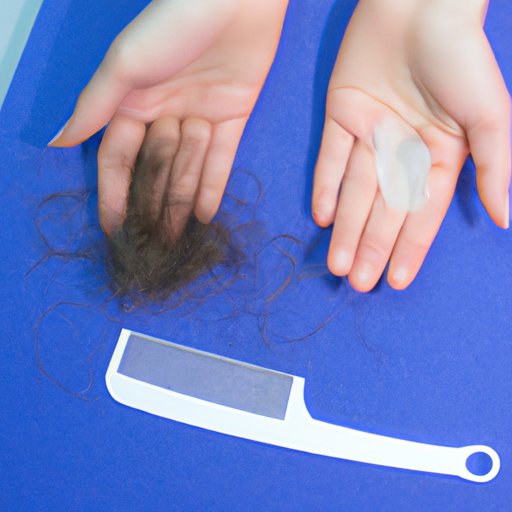Introduction
Hair shedding is a normal part of life — it’s how our bodies renew themselves and how we maintain healthy hair. But if you’re noticing more hair than usual coming out when you brush or wash your hair, you may be experiencing excessive hair shedding. In this article, we’ll explore the underlying causes of excessive hair shedding, as well as potential solutions to help you reduce the amount of hair you shed.

Identifying the Causes of Excessive Hair Shedding
Excessive hair shedding can have a variety of causes, including genetics, hormonal changes, stress, and poor nutrition. Let’s take a closer look at each one.
Genetics
Genetics play a role in many aspects of our health, and hair loss is no exception. If you’ve noticed that your parents or other family members are losing their hair, there’s a good chance that you could be genetically predisposed to hair loss as well.
Hormonal Changes
Hormones also play a role in hair loss. During puberty, hormones can cause the hair follicles to shrink, resulting in thinning hair. This is normal for both men and women, but some people experience more dramatic changes than others. Additionally, hormonal imbalances can lead to excessive hair shedding.
Stress
Stress can also cause excessive hair shedding. When you’re under a lot of stress, your body produces a hormone called cortisol. Cortisol can cause your hair follicles to shrink, resulting in thinner hair. Additionally, if you’re dealing with a lot of emotional stress, you may find yourself pulling on your hair or scratching your scalp, which can lead to excessive hair shedding.
Poor Nutrition
Finally, poor nutrition can also contribute to excessive hair shedding. If your diet is lacking in essential vitamins and minerals, it can affect the health of your hair. Additionally, crash diets or extreme calorie restriction can lead to hair loss due to malnutrition.
Understanding the Role of Genetics in Hair Loss
If you’re genetically predisposed to hair loss, it’s important to understand how this condition works. Genetic hair loss is caused by a combination of environmental factors and genes. It’s believed that the genes responsible for hair loss are passed down from parent to child, although the exact mechanism is still unknown. The most common type of genetic hair loss is male pattern baldness, which affects up to 80 percent of men by the age of 70.
If you suspect that you may have a genetic predisposition to hair loss, it’s important to talk to your doctor. They can help you determine if you have a genetic condition and recommend treatments that may be able to help.
Examining the Impact of Hormonal Changes on Hair Shedding
Hormonal changes can also cause excessive hair shedding. During puberty, both men and women experience a surge in hormones that can cause the hair follicles to shrink. This is a normal part of development, but some people experience more significant changes than others.
Additionally, hormonal imbalances can cause hair loss. If your body is producing too much of certain hormones, or not enough of others, it can result in excessive hair shedding. If you suspect that your hormones may be causing your hair loss, it’s important to talk to your doctor so they can run tests to determine if there is an imbalance.

Analyzing the Effects of Stress and Poor Nutrition on Hair Loss
Stress and poor nutrition can also contribute to excessive hair shedding. When you’re under a lot of stress, your body releases a hormone called cortisol. Cortisol can cause your hair follicles to shrink, resulting in thinner hair. Additionally, if you’re feeling emotionally stressed, you may find yourself pulling on your hair or scratching your scalp, which can lead to further hair loss.
Poor nutrition can also cause hair loss. If your diet is lacking in essential vitamins and minerals, it can affect the health of your hair. Additionally, crash diets or extreme calorie restriction can lead to hair loss due to malnutrition.
Exploring the Benefits of Natural Treatments for Hair Loss
Fortunately, there are a number of natural treatments that can help reduce hair shedding. Diet changes, such as eating more protein and increasing your intake of iron and zinc, can help improve the health of your hair. Additionally, herbal supplements such as saw palmetto and green tea extract may be beneficial. Finally, scalp massage can help stimulate the hair follicles and promote healthy hair growth.

Evaluating Potential Solutions to Reduce Hair Shedding
In addition to natural treatments, there are also several medical treatments that can help reduce hair shedding. Medications such as minoxidil and finasteride can help slow or stop hair loss. Additionally, hair transplants and wigs and hairpieces can help give the appearance of fuller hair.
Conclusion
Excessive hair shedding can be caused by a variety of factors, including genetics, hormonal changes, stress, and poor nutrition. If you’re experiencing excessive hair shedding, it’s important to identify the underlying cause so that you can find the best treatment for your needs. Natural treatments such as diet changes, herbal supplements, and scalp massage can help reduce hair shedding. Additionally, medications, hair transplants, and wigs and hairpieces can also be effective.


